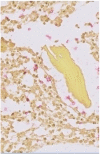Isolated cryptococcal osteomyelitis in the setting of immune reconstitution inflammatory syndrome
- PMID: 38333228
- PMCID: PMC10851753
- DOI: 10.1177/20499361241230149
Isolated cryptococcal osteomyelitis in the setting of immune reconstitution inflammatory syndrome
Abstract
Cryptococcal infections, though rare, must be considered in all immunocompromised patients. Patients with HIV/AIDS on antiretrovirals may have a treatment course complicated by immune reconstitution inflammatory syndrome. Here we present a case of a 38-year-old woman with HIV/AIDS with knee pain who only began to experience severe pain after induction of antiretroviral therapy. She was found to have cryptococcal osteomyelitis without dissemination to the central nervous system, an unusual presentation for immunocompromised patients. She was treated with oral fluconazole with a resolution of symptoms. This case report suggests conservative management of isolated cryptococcal infection with fluconazole, regardless of immune status.
Keywords: Cryptococcus; HIV/AIDS; case report; fluconazole; immune reconstitution inflammatory syndrome.
Plain language summary
Conservative treatment of isolated cryptococcus infection in a patient with a weakened immune system Cryptococcus neoformans is a fungus found in the soil which care rarely infect humans, especially those who have a weakened immune system, like those with HIV infection. The treatment of HIV in people with ‘secondary infections’, like cryptococcal infections, may cause patients to get worse before they get better as the immune system starts to function and attack the secondary infection. In this case report, we look at a patient who had untreated HIV who only began to develop symptoms of a secondary cryptococcal infection once treatment for HIV was started. However, because the cryptococcal infection was only in her bone and not throughout her body and nervous system, we were able to treat her with a conservative, oral regimen. In patients with severe cryptococcal infection or with infection of their nervous system, they often need to be treated with medications that can cause a lot of unwanted side effects. The key takeaway from this article is that conservative treatment of Cryptococcus may be effective, even in people with weakened immune systems, as long as the cryptococcal infection is isolated.
© The Author(s), 2024.
Conflict of interest statement
The authors declare that there is no conflict of interest.
Figures
Similar articles
-
Cryptococcal meningitis and immune reconstitution inflammatory syndrome in a pediatric patient with HIV after switching to second line antiretroviral therapy: a case report.BMC Infect Dis. 2020 Jan 21;20(1):68. doi: 10.1186/s12879-020-4797-2. BMC Infect Dis. 2020. PMID: 31964348 Free PMC article.
-
Practice guidelines for the management of cryptococcal disease. Infectious Diseases Society of America.Clin Infect Dis. 2000 Apr;30(4):710-8. doi: 10.1086/313757. Epub 2000 Apr 20. Clin Infect Dis. 2000. PMID: 10770733
-
Neuroimaging of HIV-associated cryptococcal meningitis: comparison of magnetic resonance imaging findings in patients with and without immune reconstitution.Int J STD AIDS. 2016 Feb;27(2):110-7. doi: 10.1177/0956462415574633. Epub 2015 Feb 18. Int J STD AIDS. 2016. PMID: 25693580
-
Cryptococcal Immune Reconstitution Inflammatory Syndrome: From Clinical Studies to Animal Experiments.Microorganisms. 2022 Dec 7;10(12):2419. doi: 10.3390/microorganisms10122419. Microorganisms. 2022. PMID: 36557672 Free PMC article. Review.
-
Isolated cryptococcal osteomyelitis of the sacrum in an immunocompetent patient: a case report and literature review.BMC Infect Dis. 2023 Feb 24;23(1):116. doi: 10.1186/s12879-023-08066-6. BMC Infect Dis. 2023. PMID: 36829132 Free PMC article. Review.
Cited by
-
Cryptococcal infection of the femur misdiagnosed as a primary bone tumor: A case report and literature review.J Int Med Res. 2025 Jul;53(7):3000605251359432. doi: 10.1177/03000605251359432. Epub 2025 Jul 25. J Int Med Res. 2025. PMID: 40712090 Free PMC article. Review.
-
Insight into the Mechanisms and Clinical Relevance of Antifungal Heteroresistance.J Fungi (Basel). 2025 Feb 13;11(2):143. doi: 10.3390/jof11020143. J Fungi (Basel). 2025. PMID: 39997437 Free PMC article. Review.
References
Publication types
LinkOut - more resources
Full Text Sources


